-

新人教版高中英语必修3Unit 2 Morals and Virtues-Reading for Writing教学设计
1. 这个寓言是一个关于一位国王古寓言。 The fable is an old fable about a king.2.作者用这个故事让读者对于社区的问题负有个人责任的必要印象深刻。The author used the story to impress upon readers with the need to take personal responsibility for problems in the community.3. 这个故事十分成功的实现了它的目的。The story was quite successful in achieving its purpose.Step 7 WritingPlease write a review of the story according the outline above.The fable is an old fable about a king who thought his people are lazy, so he put a large stone in the middle of the road and hides and waited to see if anyone will try to move it.The author used this story to impress upon readers with the need to take personal responsibility for problems in the community. The story was quite successful in achieving its purpose, and I liked it because it had a clear moral.However, while the moral of the story is clear, the actions of the king seemed pointless to me, because none of the characters in the story learnt anything. For this reason, I think there are better stories that can be used to impress upon people with the need for personal responsibility.Step 8 Pair workExchange drafts with a partner. Use this checklist to help your partner revise his/her draft.1. Does the writer give a short description of the story ?2. Does the description include the most important details of the story ?3. Does the writer give his or her opinion about the character or their actions ?4. Is the review well-organised ? 5. Does the writer use the -ing form as the adverbial correctly in the writing ?6. Are there any grammar, spelling, or punctuation errors ?Step 9 HomeworkPut up your revised draft in the classroom or read it to your class.

新人教版高中英语必修3Unit 5 The Value of Money-Reading for Writing教学设计二
2. 您能看到, 我头发太长了。You can see that my hair is much too long.3. 无论什么时候, 只要您想回来就回来。Please come back whenever you want.4. 您仅有很少的头发要理! You only have too little hair to cut !5. 为您服务是我的荣幸!It is my honour to serve you!Step 9 Writing(Henry is walking down the street when he sees a sign for a place that cuts hair. He decides to have it cut. )H=Henry B=BarberH: Good afternoon, I’d like to have my hair cut, if I may. (The barber looks at Henry’s hair and continues cutting another man’s hair. ) Er, I’d really like a haircut. As you can see it’s much too long. B: (in a rude manner) Yes, I can see that. Indeed, I can. H: Fine, well, I’ll have a seat then. (He sits in one of the barber’s chairs. The barber turns to look at Henry. )B: It’s quite expensive here, you know! Are you sure you can afford it?H: Yes. I think so. (After his hair is cut, the barber tells Henry how much he must pay. Henry shows the barber the bank note. )B: Why Mr. . . (looks shocked)H: Adams. Henry Adams. I’m sorry. I don’t have any change. B: Please don’t worry! (wearing a big smile) Nothing to worry about! Nothing at all! Please come back whenever you want, even if you only have too little hair to cut! It will be my honour to serve you!Step 10 Pair workExchange drafts with a partner. Use this checklist to help your partner revise his/her draft.1. Are all the elements of a play included and in good order ?2. Do the character use suitable language ?3. Are the stage directions clear and useful ?4. Is the plot clear and exciting enough ?
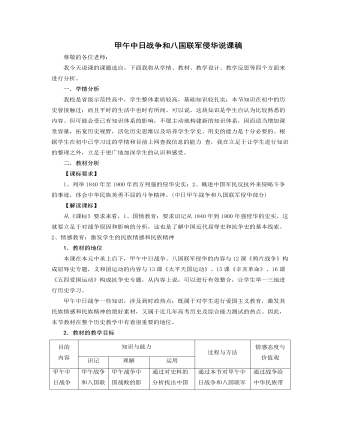
人教版高中历史必修1甲午中日战争和八国联军侵华说课稿
四.设计反思我在设计本课时,希望通过情境的创设充分再现历史,并利用多媒体辅助教学,破重点、化难点,让学生主动参与到学习过程中,从而突破狭小的教室空间,让学生真正做到感知历史,立足现实,展望未来。自主,交流、合作、探究是课程改革中着力倡导的新型学习方式。课堂教学中如何开展小组合作的探究学习存在着很多困难,首先是课堂教学时间有限,如何体现面向全体,给每个学生以机会?再次,历史问题的讨论只能依托于史料才能使讨论不沦为空谈,课堂上通过网络提供大量的史料(文字、图片或其他),势必不能有充分时间让学生阅读分析。如何解决这些问题呢?措施一:要形成较固定的历史学习合作小组。选定一位同学担任组长,负责协调措施二:要设置有利于学生探究的问题情境措施三:要把课堂教学与课外学习结合起来。在课前就印发相关的材料,或引导学生去查阅相关的资料,让学生有个充分的阅读、思考、交流的时间,是保证课堂上小组交流能成功实现的一个前提
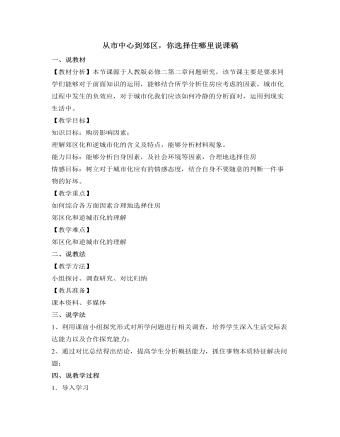
人教版高中地理必修2从市中心到郊区,你选择住哪里说课稿
课前活动:分成四组,对南京三个住房地段进行调查,新街口夫子庙、板仓、仙林,对住房居民进行问卷调查,自行设计调查问卷,分析该地段的房价要求,居民的要求,居民为何要在该地段购买住房,基础设施设置等等其它与居民购房有关的因素。◆设计意图:利用课前小组探究形式对所学问题进行相关调查,不仅让学生掌握知识了解知识来源于社会还能培养学生深入生活交际表达能力以及合作探究能力;3.问题设计同学们,不知道你们在调查过程中是否发现一个问题,郊区的房子,特别是别墅,都是些高档居所,许多有钱人的居住场所,那为什么会这样呢?伴随着城市化进程中居民都往城里挤,为什么还会有许多有钱人往郊区搬呢?这就是我们今天要研究的第二个问题:逆城市化。◆设计意图:承转过渡知识,从购房选择因素的学习过渡到郊区化的学习,同时培养学生发现问题的能力,给学生以启迪。
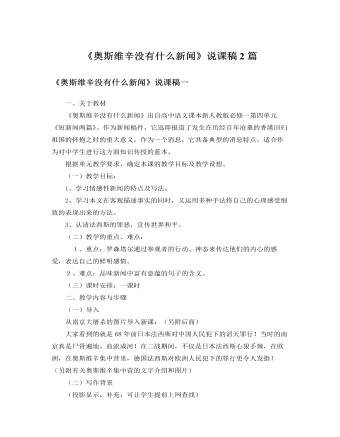
人教版高中语文必修1《奥斯维辛没有什么新闻》说课稿2篇
第11段很短,只点出了这是“在妇女身上搞不育试验的地方”,但在最末又加了一句“否则他会羞红了脸的”,这是为什么?那肯定是一个极为肮脏,极为残酷的地方。据资料记载:当时的希特勒制定一项令所有被征服或占领国家的民族充当奴隶并且逐渐消亡的隐密性种族灭绝计划——高效率、大规模的强制绝育。为此,数以百计的纳粹医生、教授、专家甚至护士,在行政管理专家的通力合作下,相继提出了几十种绝育方法,十余种实施方案,并且在奥斯维辛、拉芬斯布吕克、布亨瓦尔特、达豪等十多个大型集中营内对数以万计的犹太、吉普赛囚犯、因从事抵抗运动而被捕的政治犯和男女战俘进行了残酷的手术试验,造成他们大量死亡或者终身残疾、终身不育。这样残酷的毫无人性的手段,任谁也不愿看到。
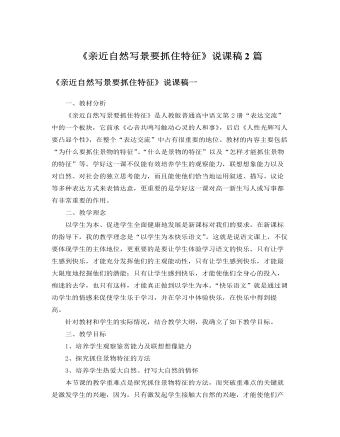
人教版高中语文必修2《亲近自然写景要抓住特征》说课稿2篇
我选取这两组例子的目的就是要学生在阅读对比中明白“横看成岭侧成峰。远近高低各不同”的道理。要让学生明白:看同一景物,观者所处的方位不同,角度不同,收到的效果也不同。最后教师明确:要写出景物的特征,首先得仔细观察,并注意观察点的变化。然后追问:抓住景物的特征还有哪些要求?让学生带着问题再来看多媒体出示的夜晚荷塘图和泰山松的有关图片,先让学生尝试描写,然后再出示《荷塘月色》和《雨中登泰山》中和图片有关的两段描写。这两段分别是:“曲曲折折的荷塘上面,弥望的是田田的叶子……仿佛远处高楼上渺茫的歌声似的。”(《荷塘月色》),“但是把人的心灵带到一种崇高境界的,是那些“吸翠霞而夭矫的松树……都让你觉得他们是泰山的天然主人,好象少了谁都不应该似的。”(《雨中登泰山》)。
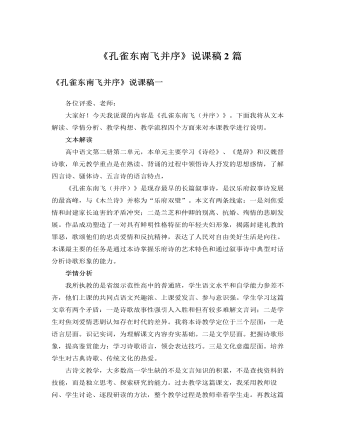
人教版高中语文必修2《孔雀东南飞并序》说课稿2篇
4、问题策略。引导学生提出问题、提出有价值的问题,是探究性学习的难点,也是课堂教学最有活力、最具创造力的亮点。我设计的课堂问题有:诗歌着力赞颂刘焦坚贞爱情和反抗精神,但他们许多地方却表现的非常顺从呢?焦母如此专横固执,为什么在焦刘悲剧发生后又要求合葬呢?这些由诗句生发的问题,会深深打动作学生的心灵,诱导学生去读诗,去背诗,去体味诗。5、手段方法。借助多媒体课件10个幻灯片、课文音频诵读资料、课文相关的文字资料,采用诵读法、讨论法、探究法等教学方法进行本课教学。6、板书设计:板书是教学内容的浓缩。根据教学重点和本诗特色,我的板书分预设和生成两块。预设板书设计有文章标题、情节结构、艺术特色三部分。文章标题孔雀东南飞情节结构被遣——誓别——抗婚——殉情——化鸟艺术手法①人物对话的个性化②铺陈排比的手法③起兴和尾声
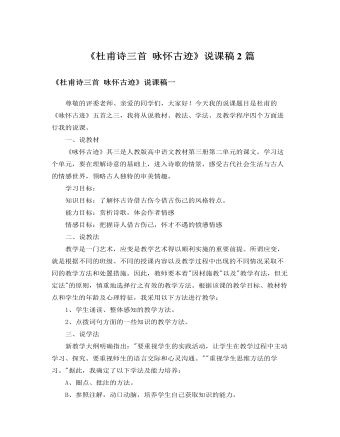
人教版高中语文必修3《杜甫诗三首 咏怀古迹》说课稿2篇
第三,说教学重点和难点。根据课程标准的具体要求、学生实际和社会实际以及教材的逻辑结构和教学体系,我认为本课的重难点是以下几个方面。教学重点:1.理解王昭君的形象2.深入理解杜甫在诗中的情感教学难点:理解寓意,把握主旨。第四,说教法与学法。教法:根据课文特点和学生实际情况,以诵读法(示范朗读、学生齐读)、问题探究法、点拨法、讨论分析法进行教学。首先激发学生学习本文的兴趣;然后引导学生反复吟哦诵读,在读的过程中质疑、思考、品析、鉴赏;最后在教师适当的点拨下,在集体的热烈讨论中,理解作者的感情,得到新的认识。(解说:使学生在教师的主导下围绕中心议题发表各自的意见,相互交流,相互启发,相互争议,激发他们主动去获取知识,培养健康情感。)
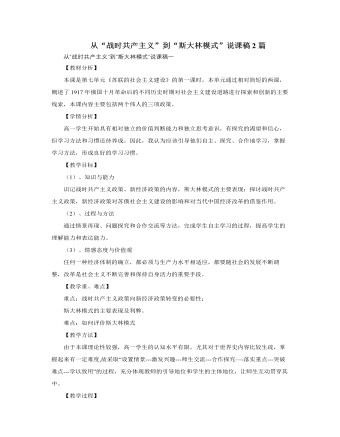
人教版高中历史必修2从“战时共产主义”到“斯大林模式”说课稿2篇
【课堂小结】本课主要讲述俄国十月革命后进行经济建设,并在建设中进行社会主义探索,期间先后出现了战时共产主义政策、新经济政策和斯大林模式,这些政策和体制的产生都是历史和当时现实有关,但也反映出在建设社会主义中既有成功的也由重大失误,主要在于缺乏现成的政策和模式可供借鉴,更在于理论上的缺乏。斯大林模式的形成同苏联当时社会生产力的发展水平相适应,它在初期和战争时期曾发挥了巨大作用,使苏联成为强大的社会主义国家。它建立的高度集中的计划经济体制和新型的工业化模式是苏联进行社会主义建设中的探索和创新,对二战后社会主义国家产生了深刻影响,促进这些国家国民经济的恢复和发展,形成了足以同资本主义相抗衡的社会主义阵营。但是,它没有解决社会主义民主政治建设和经济运行的一系列根本问题,违背了列宁关于把文化经济建设当作工作重心的指示,仍把政治斗争放在第一位。
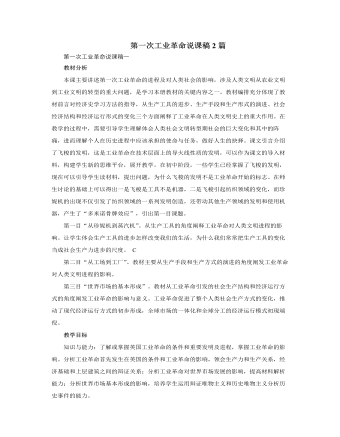
人教版高中历史必修2第一次工业革命说课稿2篇
3、工业革命引起社会关系变化——形成两大对立的工业资产阶级和无产阶级工业资产阶级和工业无产阶级成为社会的两大阶级。工业资产阶级获得更多的政治权利,各国通过改革,巩固了资产阶级的统治。 4、工业革命推动资产阶级调整内外政策——自由主义与殖民扩张对内,希望进一步摆脱封建束缚,要求自由经营、自由竞争和自由贸易。重商主义被自由放任政策所取代。对外,加快了殖民扩张和殖民掠夺的步伐。三、世界市场的基本形成1、原因条件(1)工业革命的展开使世界贸易的范围和规模迅速扩大1840年前后,英国的大机器工业基本上取代了工场手工业,率先完成了工业革命,成为世界上第一个工业国家。之后,法国和美国等国也相继完成工业革命。随着工业革命的展开,资产阶级竭力在全世界拓展市场,抢占原料产地,使世界贸易的范围和规模迅速扩大。
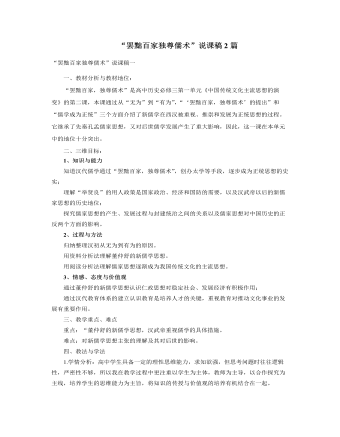
人教版高中历史必修3“罢黜百家独尊儒术”说课稿2篇
1、汉武帝尊儒的措施:(1)政治方面:起用很多儒学家参与国家大政。他规定,地方定期选出孝子、廉吏当中央任官,甚至还擢升平民、儒士为相。这明显扩大了官员的队伍,提高了官员的文化素质,巩固了封建统治基础,成为汉武帝文治武功的重要组成部分。也给后世封建王朝在用人方式方法上面提供了宝贵的借鉴和启迪。(2)思想方面:采纳董仲舒的建议,“罢黜百家 独尊儒术”(3)教育方面:儒家经典“五经”为国家规定的教科书。兴办太学和设立地方学校进行儒学教育。公元前136年,汉武帝正式规定《诗》、《书》、《礼》、《易》、《春秋》为“五经”;前124年,又在长安兴办太学,规定太学生员为博士弟子,一律由儒家五经博士负责教授,学完经考试合格后即可到政府任官。这是封建国家利用政权的力量兴办教育、提倡儒学,其必然对整个社会的教育事业有一定的导向作用。
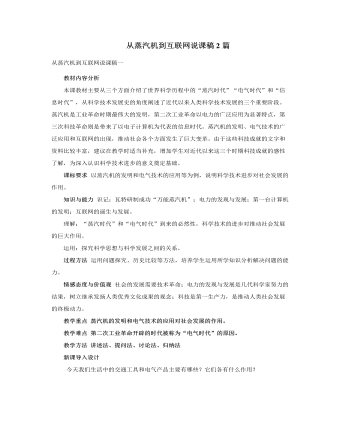
人教版高中历史必修3从蒸汽机到互联网说课稿2篇
2、互联网的功用:(1)功用:提供文件传输、电子信箱、聊天等服务,在社会各个领域发挥了巨大的作用,标志着信息化社会的出现。(2)特点:网络媒体作为一种新的传播媒体,具有界面直观、音色兼备、链接灵活和高速传输的特点。3、互联网的影响:教师提问,学生思考回答,教师总结 (1)信息经济在世界各地全面发展,加快了经济全球化的步伐;(2)传统产业也借助互联网提高管理水平,并通过全球营销和采购扩大市场;(3)在互联网时代,人们可以在家里完成很多工作,提高了工作效率,增加了乐趣;(4)人们的社会交往方式也发生着改变。(5)也带来一些负面影响。【合作探究】3:青少年如何对待网络:互联网在给社会带来巨大效能的同时,也带来了巨大的挑战。青少年应该提高自身的道德素养,树立正确的网络观,让网络发挥出应有的作用。
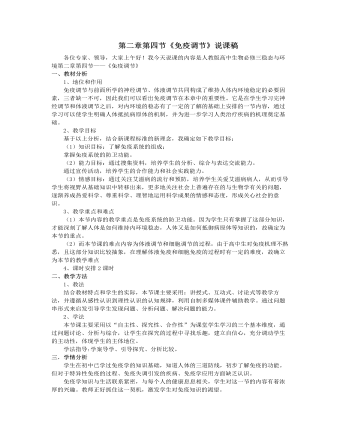
人教版高中生物必修3第二章第四节《免疫调节》说课稿
(四)、活动交流,体验科学通过资料分析讨论以下三个问题:1、你知道爱滋病的传播途径吗?2、如何预防爱滋病?3、我们应如何对待爱滋病患者?面对艾滋病我们能做些什么?从而进入情感态度的教育。除此之外,我还设计一个开放性的作业“向全社会为关注艾滋病设计一个宣传广告”(形式不限,漫画、板书、倡议书等),让学生把爱心付诸于实际行动。在此基础上引出“免疫学的应用”从免疫预防、免疫治疗、器官移植三个方面讲述,让学生充分体验到知识和社会生活的紧密联系,让他们不在感到科学是那么的遥远,而是可爱的有用的。通过交流,让同学们体会到合作的魅力和重要性,进一步培养合作意识和合作能力。最后我设计一个资料搜集,让同学们选一个感兴趣的主题利用电脑在网上搜集有关资料。主题:1、你知道世界艾滋病日吗?历年的主题是什么?开展世界艾滋病运动有什么意义?
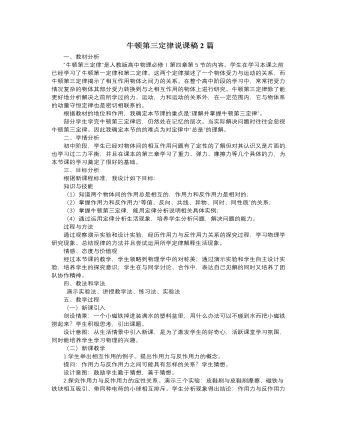
人教版新课标高中物理必修1牛顿第三定律说课稿2篇
问:为什么会出现这样的情况,男女生之间的拉力存在着怎样的大小关系?进一步求证这两个力的大小关系经过共同讨论,得方案:把两个弹簧秤勾在一起,重现拔河比赛,分三种情况进行。(通过摄像头把弹簧秤的读数放大)两弹簧称勾在一起拉,处于静止不动时(即拔河比赛,双方处于僵持状态)两弹簧称勾在一起拉,并向一方运动(即比赛绳子被拉向一方时的状态)3、两弹簧称勾在一起拉,一方方向慢慢改变(两力方向始终在一条直线上)实验结论:两弹簧称的读数的变化总是相同的,大小相等,方向相反。得到牛顿第三定律:追问:既然两个力大小相等,那么拔河比赛为什么还存在胜负之分?讲清作用力与反作用力作用的受力物体不同,并和学生讨论如何做才会获胜。回应课前问题:“以卵击石”为什么鸡蛋碎?
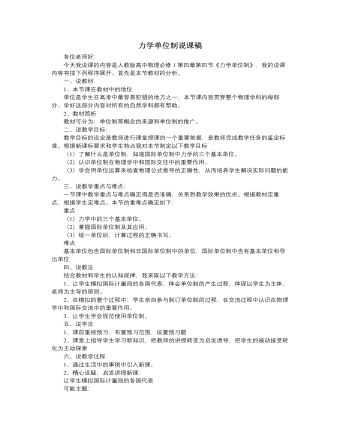
人教版新课标高中物理必修1力学单位制说课稿
今天我说课的内容是人教版高中物理必修1第四章第四节《力学单位制》,我的说课内容将按下列程序展开。首先是本节教材的分析。一、说教材1、本节课在教材中的地位单位是学生在高考中最容易犯错的地方之一,本节课内容贯穿整个物理学科的每部分。学好这部分内容对所有的自然学科都有帮助。2、教材简析教材可分为:单位制等概念的来源和单位制的推广。二、说教学目标:教学目标的设定是教师进行课堂授课的一个重要依据,是教师完成教学任务的鉴定标准。根据新课标要求和学生特点我对本节制定以下教学目标(1)了解什么是单位制,知道国际单位制中力学的三个基本单位。(2)认识单位制在物理学中和国际交往中的重要作用。(3)学会用单位运算来检查物理公式推导的正确性,从而培养学生解决实际问题的能力。
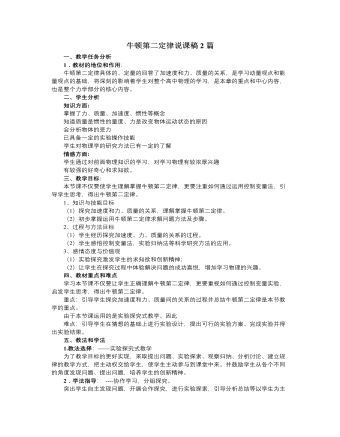
人教版新课标高中物理必修1牛顿第二定律说课稿2篇
进一步引导学生思考利用数学知识可写成等式F=kma学生很自然就会思考比列系数K应该是多少?通过教师引导学生举例各国长度单位不同(如英国:英里、码、英尺、英寸;中国:市里、市丈、市尺、市寸、市分 )导致交流不便。为了适应各国交流需要国际计量局规定了一套统一的单位,称为国际单位制 。取不同的单位制K是不同的,为了简洁方便,在选取了质量和加速度的国际单位(Kg, m/s2)时规定K=1。那么就有;F=ma为了纪念牛顿,就把能使1kg物体获得1m/s2加速度的力称做一牛顿,用符号N表示问题:实际物体受力往往不止一个,多个力情况应该怎么办呢?平行四边形法则进一步引导学生得出牛顿第二定律更一般的表达式: F合=ma思考.讨论我们用力提一个很重的箱子,却提不动它。这个力产生了加速度吗?要是产生了,箱子的运动状态却并没有改变。为什么?
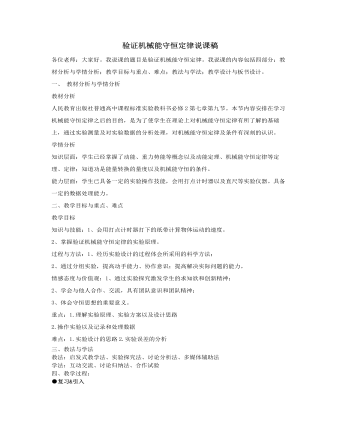
人教版新课标高中物理必修2验证机械能守恒定律说课稿
一、 教材分析与学情分析教材分析人民教育出版社普通高中课程标准实验教科书必修2第七章第九节。本节内容安排在学习机械能守恒定律之后的目的,是为了使学生在理论上对机械能守恒定律有所了解的基础上,通过实验测量及对实验数据的分析处理,对机械能守恒定律及条件有深刻的认识。学情分析知识层面:学生已经掌握了动能、重力势能等概念以及动能定理、机械能守恒定律等定理、定律;知道功是能量转换的量度以及机械能守恒的条件。能力层面:学生已具备一定的实验操作技能,会用打点计时器以及直尺等实验仪器。具备一定的数据处理能力。二、教学目标与重点、难点教学目标知识与技能:1、会用打点计时器打下的纸带计算物体运动的速度。2、掌握验证机械能守恒定律的实验原理。
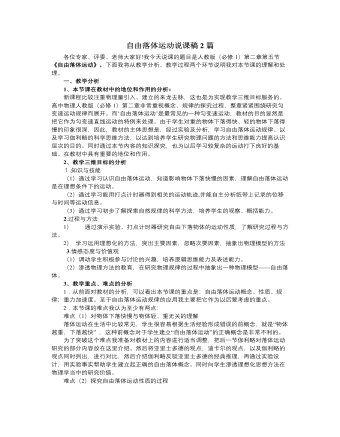
人教版新课标高中物理必修1自由落体运动说课稿2篇
学生回答的方法多样,让各小组根据自己讨论出来的方法对自己实验出来的纸带进行数据处理,并求出加速度,并且将多条纸带都进行处理,同时提醒学生对纸带的选择。接着,我会用多媒体展示重物下落实验打出来的纸带,用表格列出一段纸带上各点的瞬时速度,准确画出v-t图像,求出加速度,将结果给予学生的结果作对比,确定出正确结论。最后让学生分析总结:自由落体运动是初速度为零的匀加速直线运动,而且,多条纸带算出来的加速度的数值都接近相等,即加速度在实验误差允许范围内是相等的。引出重力加速度,介绍概念、方向及大小。(强调“同一地点”,让学生阅读教材中一些地点的重力加速度,可以了解重力加速度的大小与纬度有关,纬度越大加速度越大)。学习了重力加速度后让学生根据之前学习的匀变速直线运动公式推导出自由落体的运动规律。设计意图:让学生在学习过程中的主体地位和自主观能动性得到充分发挥,取长补短,培养了学生的实验操作能力,又使学生对自由落体运动的性质有深刻的印象,从而解决了本节课第二个难点。
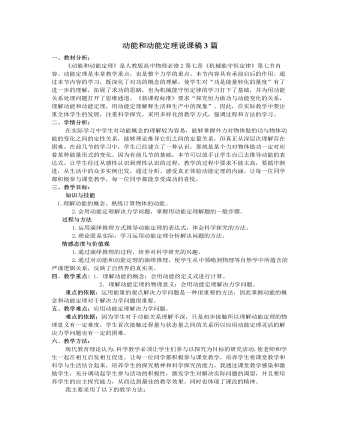
人教版新课标高中物理必修2动能和动能定理说课稿3篇
2、教学目标根据我对教材的理解、结合学生的实际情况、渗透新课程的教学理念,为提高全体学生的科学素养,按课程标准,以促进全体学生发展为目的。从知识与技能、过程与方法,情感态度与价值观三个方向培养学生,拟定三个教学目标:知识与技能:(1)知道什么是动能。(2)正确理解和运用动能公式分析、解答有关问题。(3)掌握外力对物体所做的总功的计算,理解“代数和”的含义。(4)理解和运用动能定理。过程与方法:通过演绎推理过程,培养科学研究兴趣,领略物理学中所蕴含的严谨的逻辑关系。情感、态度、价值观:通过运用动能定理分析解决问题,感受成功的喜悦,培养学生对科学研究的兴趣。3、教学的重点和难点重点:理解动能定理、应用动能定理解决力学问题。难点:应用动能定理解决多个过程的力学问题,以及变力做功或曲线运动中的动能定理运用。
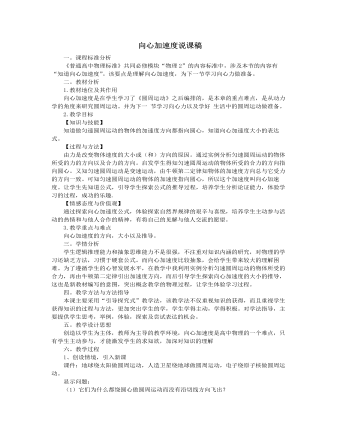
人教版新课标高中物理必修2向心加速度说课稿
d.某物体沿直线向东运动,原来的速度是5m/s,2s后速度减小到3m/s,求2s内物体速度变化。④如何探究物体作匀速圆周运动时,在Δt时间内的速度变化?分析:有了同一直线上速度变化的铺垫后,讨论物体做匀速圆周运动速度的变化就比较自然了,为了给向心加速度方向的学习打好基础,可以通过小组协作,进一步完成下列思考题,使同学们认识到:时间间隔起短,速度变化的方向起接近半径方向。(多媒体屏幕投影)a.物体沿半径为1m的轨道做匀速圆周运动,线速度大小为,求1s内物体速度变化并画出1s内速度变化的示意图。b.分别求出上题中物体在0.5s、0.25s内速度变化并画出相应的示意图。由于没有办法直接利用实验来验证速度变化的方向,所以,我们采用提供思考题的方法,引导同学在合作学习、自主探究中完成。有了速度变化的研究为铺垫,加速度的方向问题就迎刃而解了。

